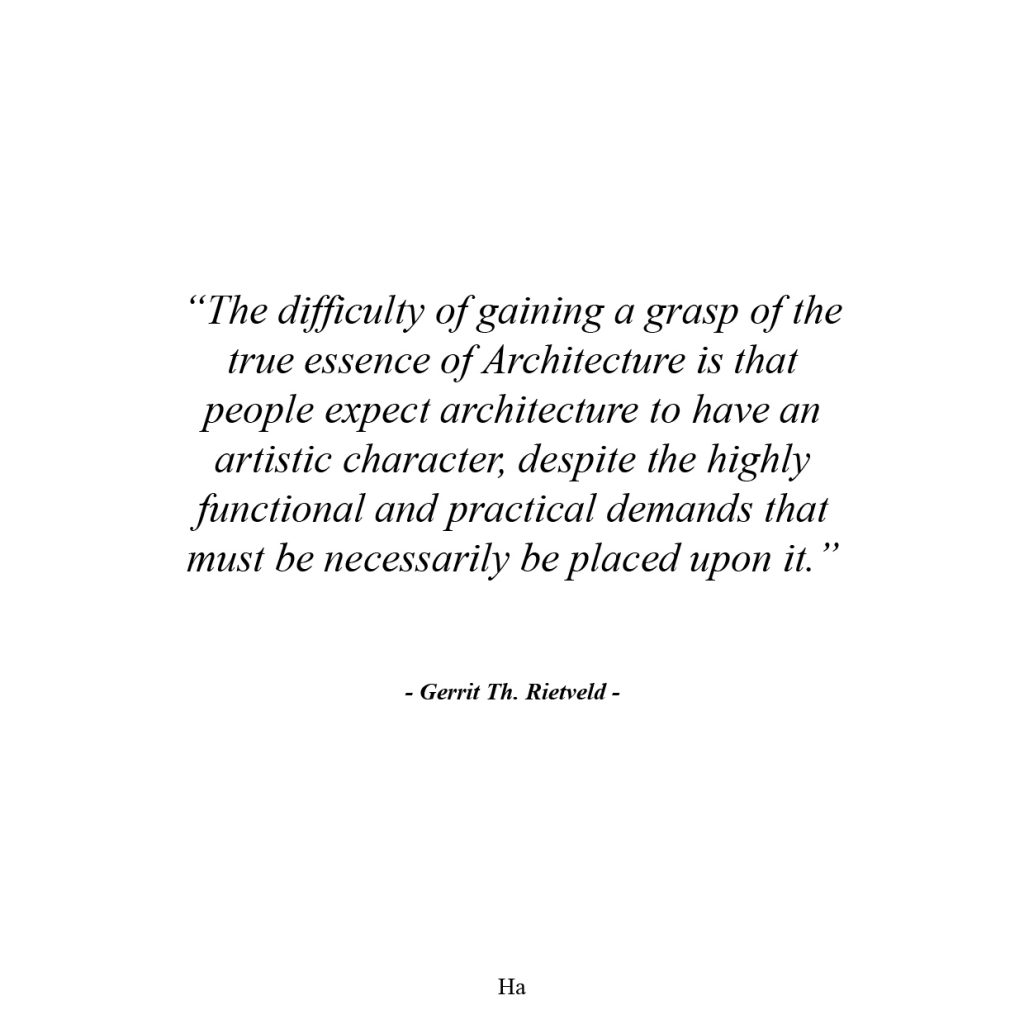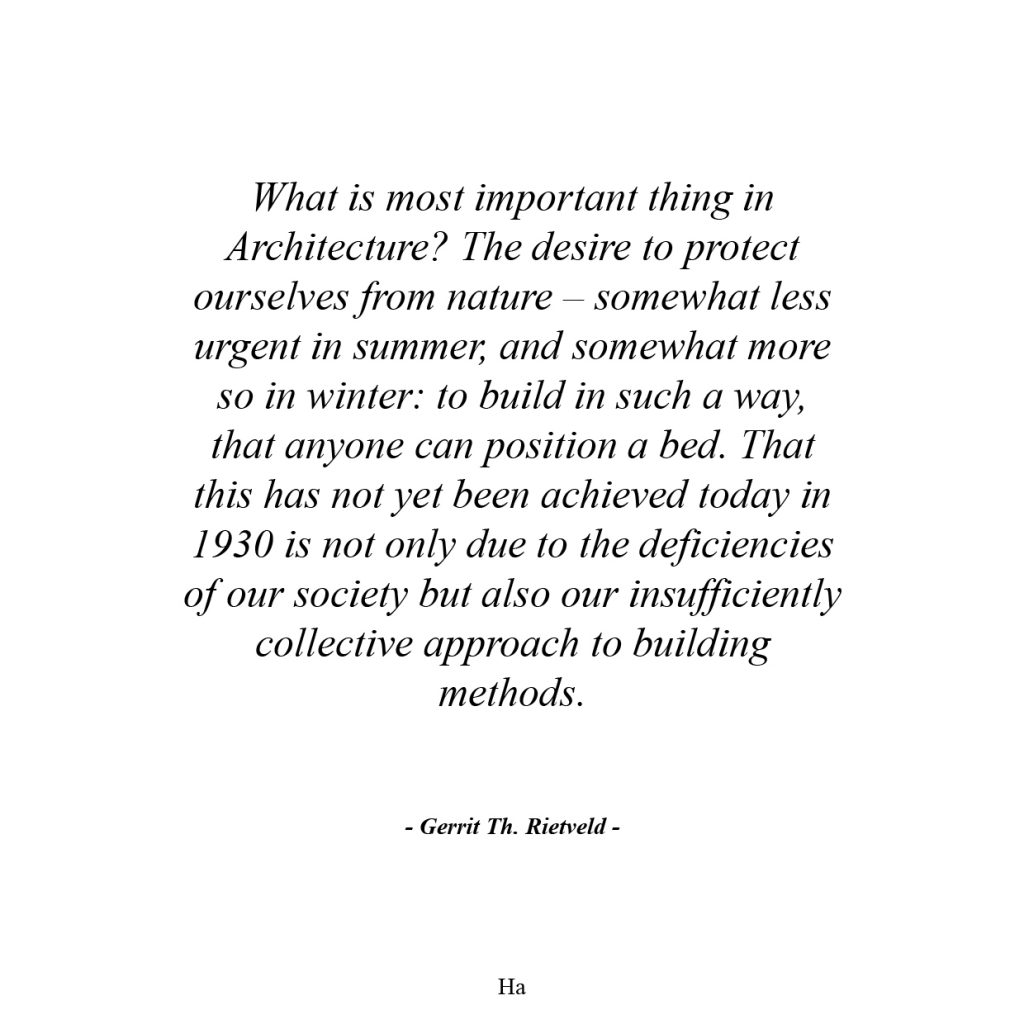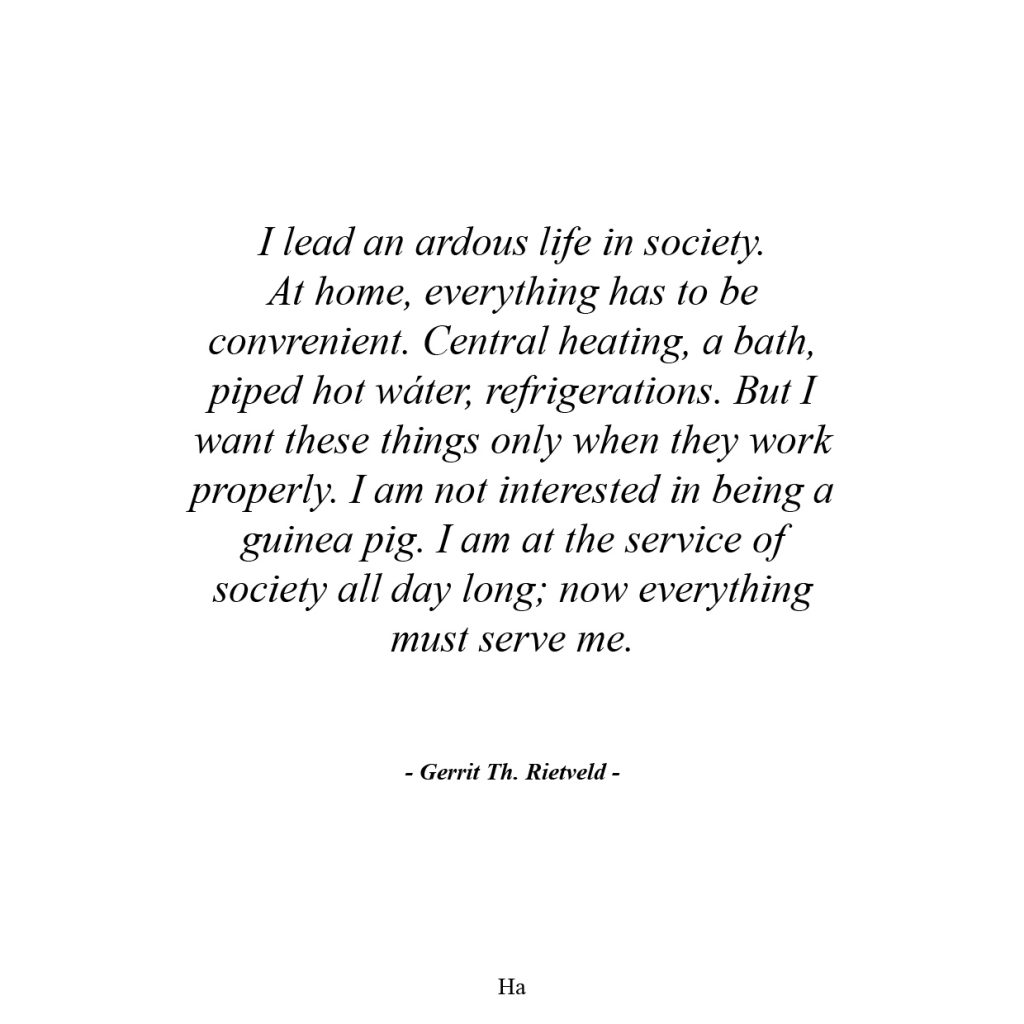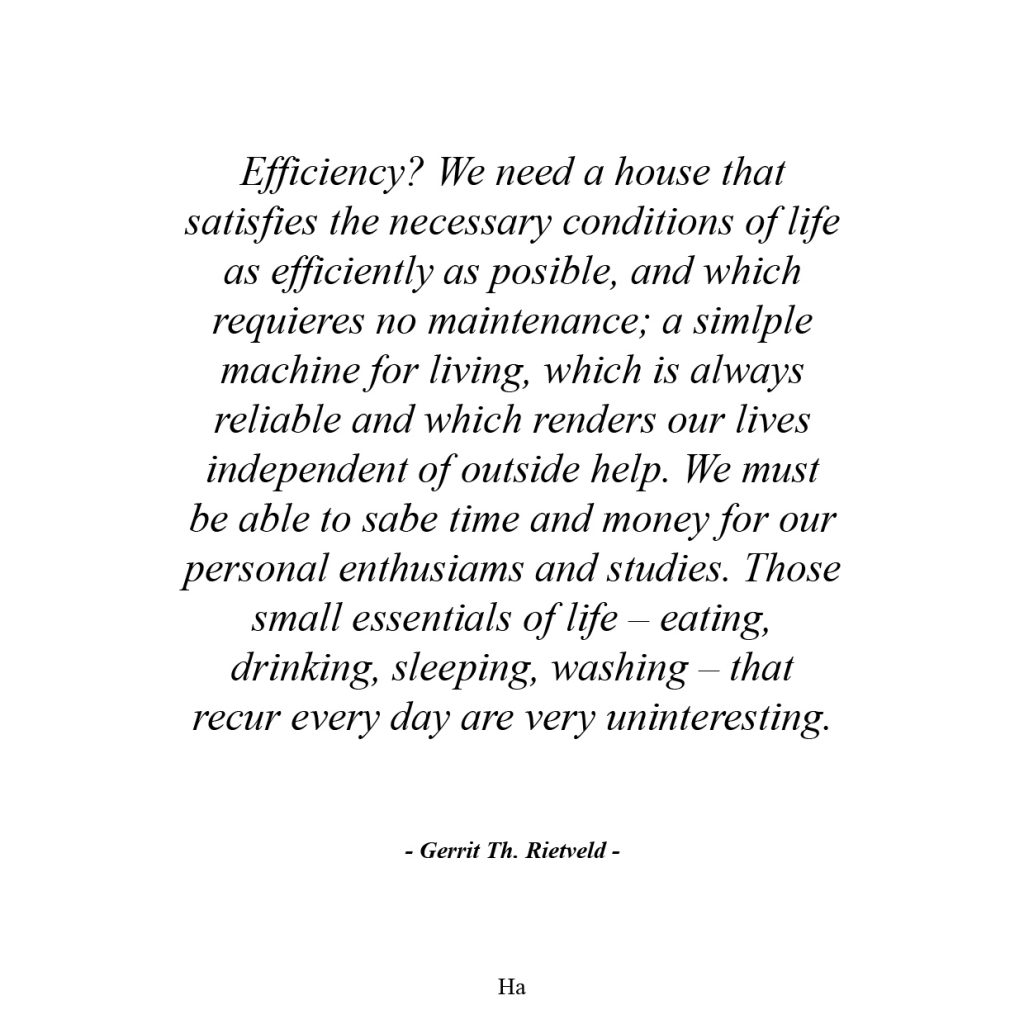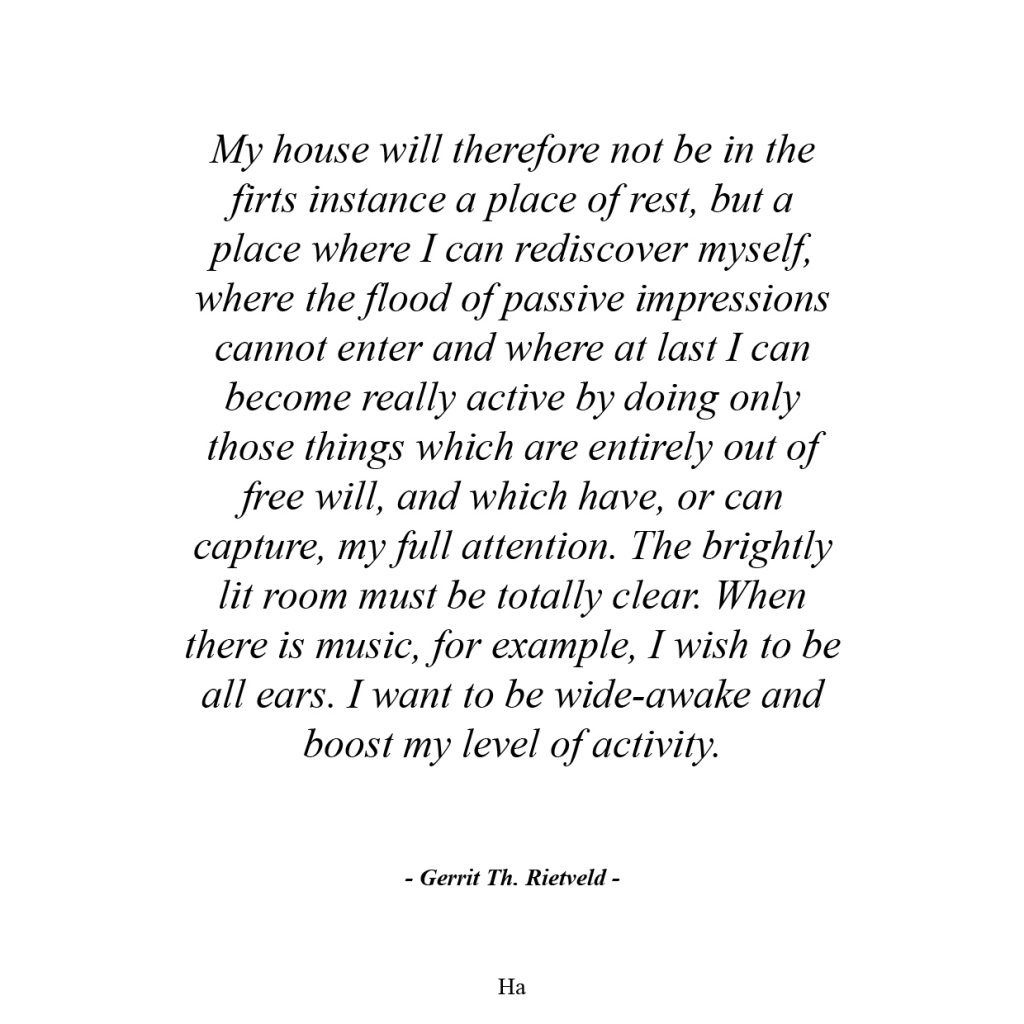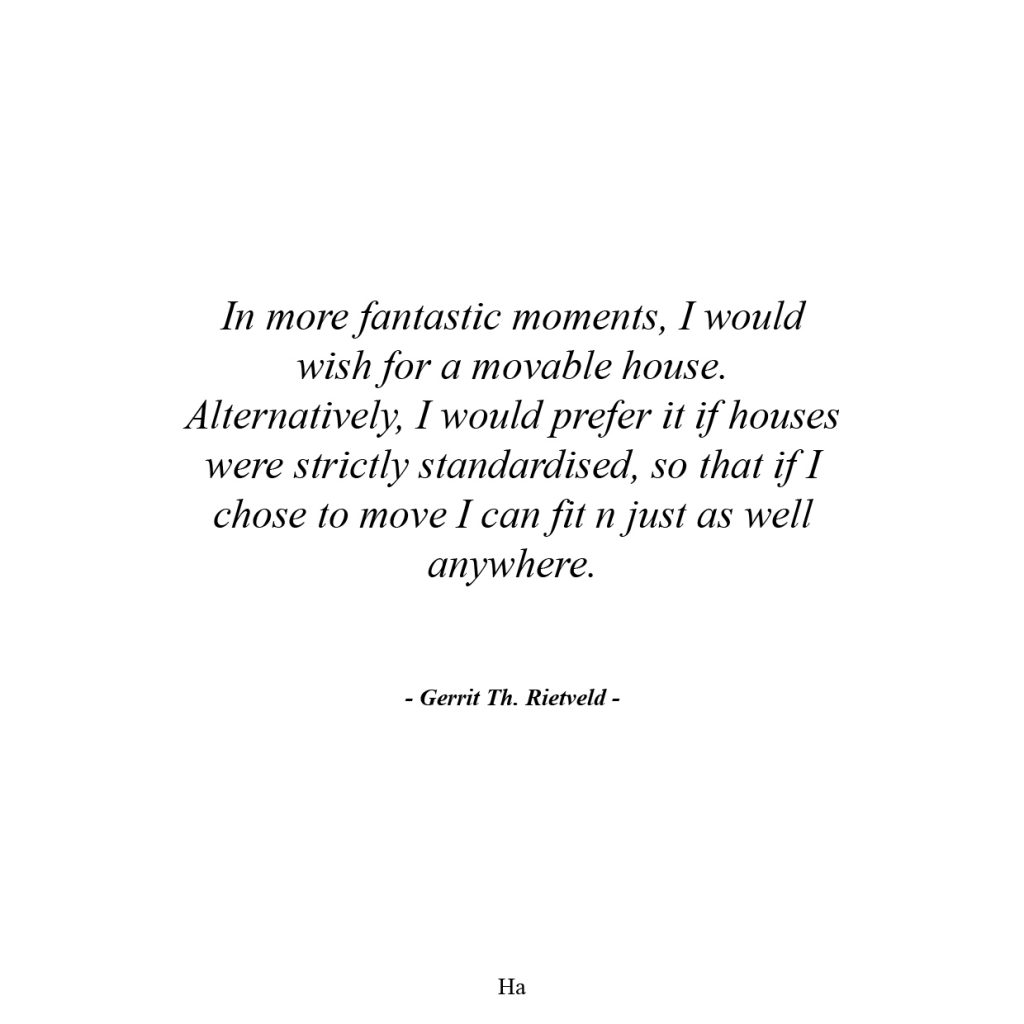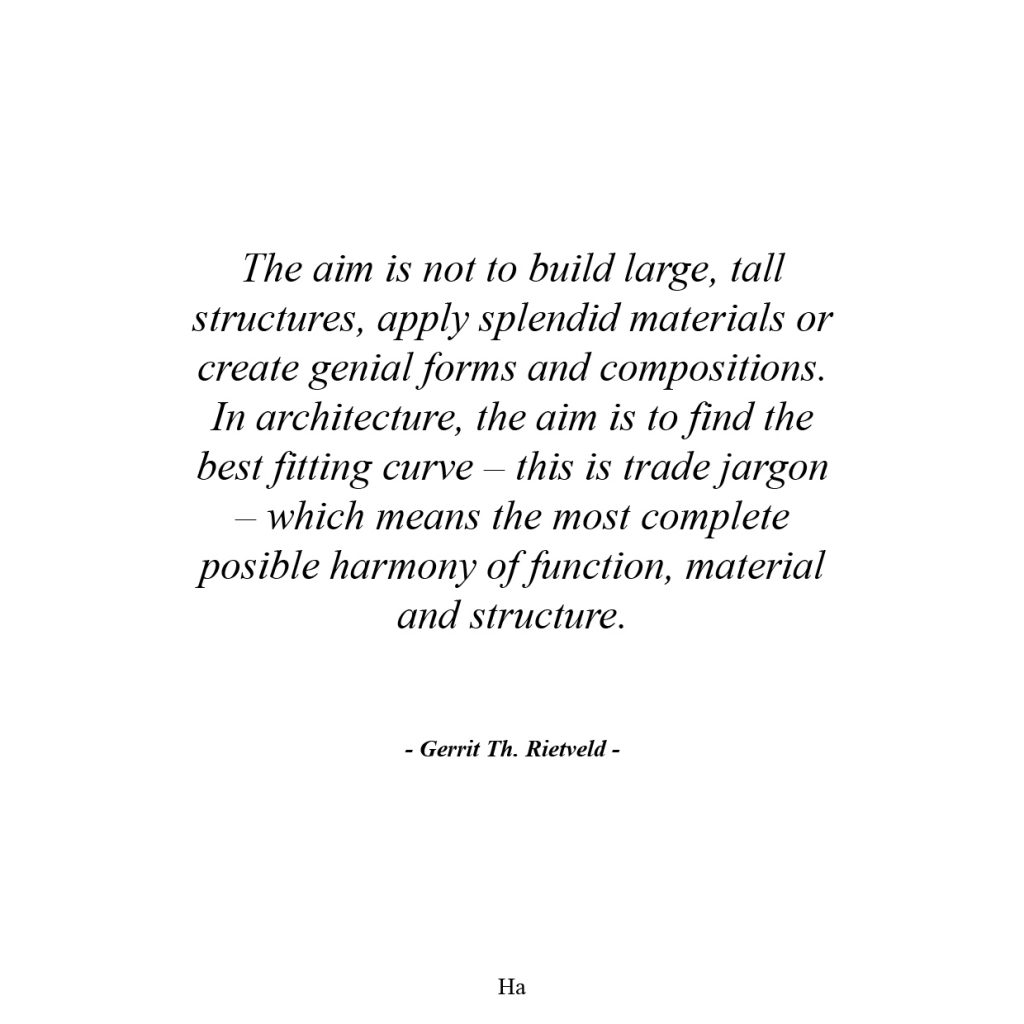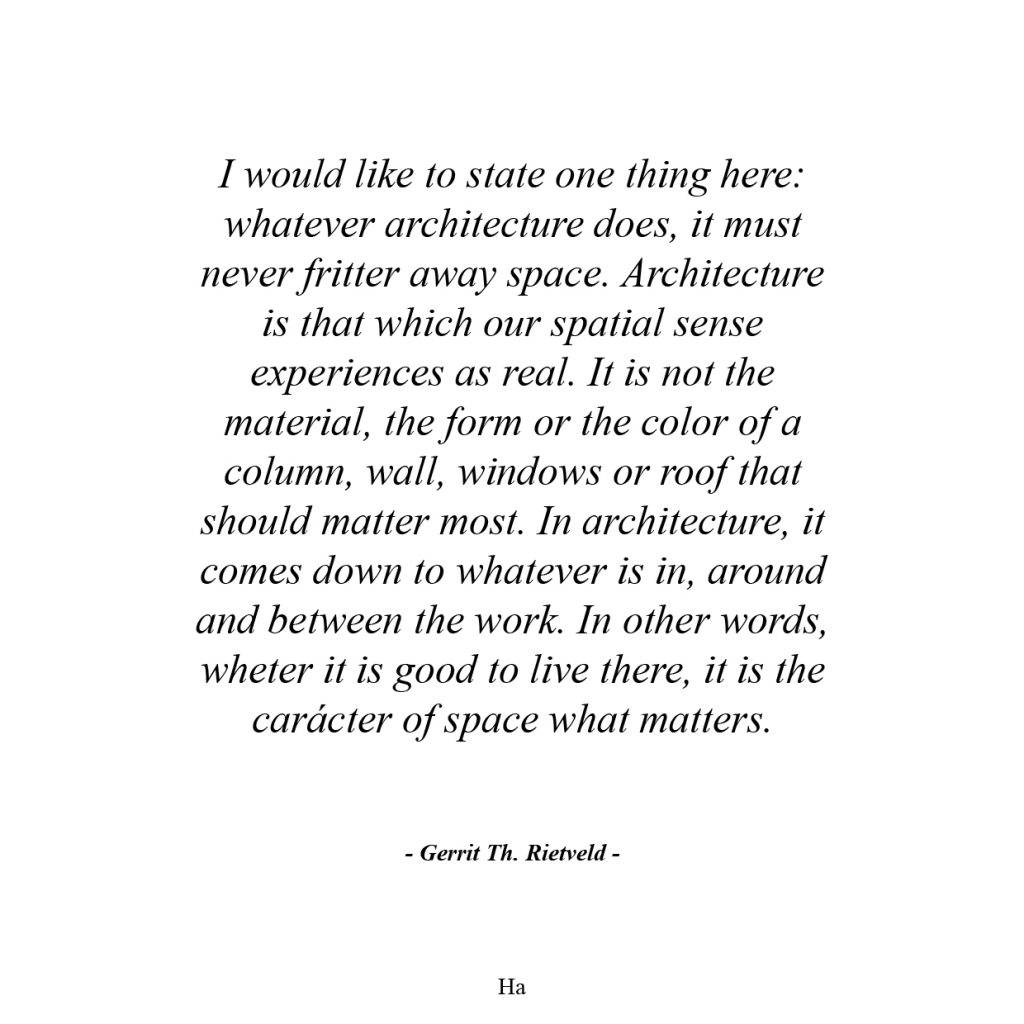Architecture
1930
Gerrit Th. Rietveld
This article is part of the Hidden Architecture series “A Hard Rain’s A-Gonna Fall”, where we will try to publish and bring back to current days forgotten texts and manifestos written by architects which are essential to understand the discipline of Architecture within our social context.
Este artículo forma parte de la serie desarrollada por Hidden Architecture llamada “A Hard Rain’s A-Gonna Fall”, donde intentaremos publicar y poner de actualidad nuevamente textos y manifiestos olvidados, escritos por arquitectos y fundamentales para entender la arquitectura dentro de nuestro contexto social.
The difficulty of gaining a grasp of the true essence of architecture is that people expect architecture to have an artistic character, despite the highly functional and practical demands that must be necessarily be placed upon it.
Without explanation, we take it as axiomatic thaht, though art and practical life may often seem to contradict one another in society, when they exist in their highest forms as perfect fusión between them is nonetheless not just potentially but physically present. When taht happens we refer to it in terms of (for example) elementary beauty. Such judgements are a kind of retrospective analysis, however. Let us start at the beginning and study the thinking of a rational architect.
What is most important thing in Architecture? The desire to protect ourselves from nature – somewhat less urgent in summer, and somewhat more so in Winter: to build in such a way, that anyone can position a bed. That this has not yet been achieved today in 1930 is not only due to the deficiencies of our society but also our insufficiently collective approach to building methods.
La dificultad de comprender la verdadera esencia de la arquitectura es que la gente espera que la arquitectura tenga un carácter artístico, a pesar de las demandas altamente funcionales y prácticas que necesariamente se le deben imponer.
Sin explicación, lo tomamos como algo axiomático, aunque el arte y la vida práctica a menudo parecen contradecirse mutuamente en la sociedad, cuando existen en sus formas más elevadas, ya que la fusión perfecta entre ellas no es solo potencialmente sino físicamente presente. Cuando sucede, nos referimos a ello en términos de (por ejemplo) belleza elemental. Tales juicios son una especie de análisis retrospectivo, sin embargo. Comencemos por el principio y estudiemos el pensamiento de un arquitecto racional.
¿Qué es lo más importante en Arquitectura? El deseo de protegernos de la naturaleza: algo menos urgente en verano y algo más en invierno: construir de tal manera que cualquiera pueda colocar una cama. Que esto todavía no se haya logrado hoy en 1930 no se debe solo a las deficiencias de nuestra sociedad sino también a nuestro enfoque insuficientemente colectivo a los métodos de construcción.
In devising a building method for a new city extensión, the possibility must be borne in mind of accommodating the 1.800 million inhabitants on this Earth in such a way that their most important needs are satisfied; then we can gradually strive towards what is still a highly prosaic goal. Is this such a complicated problema thaht we still need to talk about it?
Suppose we let different people tell us what kind of house they would like. We would then see them appear type by type in the same way as when they rise in the architect’s thoughts when he starts working for them.
Al idear un método de construcción para una nueva extensión de la ciudad, debe tenerse en cuenta la posibilidad de alojar a los 1.800 millones de habitantes en esta Tierra de forma que se satisfagan sus necesidades más importantes; entonces podemos esforzarnos gradualmente hacia lo que todavía es una meta muy prosaica. ¿Es esto un problema tan complicado que todavía tenemos que hablar sobre eso?
Supongamos que dejamos que diferentes personas nos digan qué tipo de casa les gustaría. Entonces los veríamos aparecer tipo por tipo de la misma manera que cuando surgen en los pensamientos del arquitecto cuando comienza a trabajar para ellos.
1.
Why not just keep simple, like those building firms that produce houses to a pattern, without involving an architect? It seems an obvious thing to do. That kind of builder has plenty pf practical experience; he knows the prices and the quality of the materials and he knows what the labourers are capable of handing and what they are familiar with. Above all, he knows the kind of things people rento r buy. For years, people have been telling him about the merits and problems with his products. He has always been on hand to attend to any defects that appear. So why not build something like those solid Little building firms, which after all build 80% of our new housing?
¿Por qué no simplemente hacerlo simple, al igual que las empresas de construcción que producen casas en serie, sin la participación de un arquitecto? Parece una cosa obvia de hacer. Ese tipo de constructor tiene mucha experiencia práctica; él conoce los precios y la calidad de los materiales y sabe lo que los trabajadores son capaces de entregar y con lo que están familiarizados. Sobre todo, él sabe el tipo de cosas que la gente quiere comprar. Durante años, la gente le ha comentado sobre los méritos y problemas con sus productos. Él siempre ha estado disponible para atender cualquier defecto que aparezca. Entonces, ¿por qué no construir algo así como esas sólidas pequeñas empresas de construcción, que después de todo construyen el 80% de nuestras nuevas viviendas?
2.
Sometimes it is necessary to build something that rises above everyday convention, to avoid descending into tedium. So what other possibilities are there?
A veces es necesario construir algo que se eleve por encima de la convención cotidiana, para evitar caer en el tedio. Entonces, ¿qué otras posibilidades hay?
3.
A love of nature flares up in every one now and then. Then the person says: I feel to hemmed in by a district full of mass-produced housing. The houses and the streets, and even the Little gardens, are generally too cramped for my taste. Nature is vast, big enough for everyone to find a place in it. The greatest part of Earth’s surface is uninhibited. If we were simply to continue the same way f town building, we would need no more than half the area of Germany to house all the people in the world. It is far too confined here- Let’s build houses that are well-spaced and simple; otherwise I will always flee my home in search of Nature. To me, eating and drinking are important. Providing for these things interests me more than an over-inflated technology. The most important thing is to perfect the self.
El amor a la naturaleza se agudiza en cada uno de vez en cuando. Entonces la persona dice: me siento acorralado por un distrito lleno de viviendas producidas en masa. Las casas y las calles, e incluso los pequeños jardines, en general son demasiado estrechos para mi gusto. La naturaleza es enorme, lo suficientemente grande como para que todos puedan encontrar un lugar en ella. La mayor parte de la superficie de la Tierra no está habitada. Si simplemente tuviéramos que continuar de la misma manera en la construcción de la ciudad, no necesitaríamos más de la mitad del área de Alemania para albergar a todas las personas en el mundo. Se está demasiado apretado aquí. Construyamos casas que estén bien espaciadas y simples; de lo contrario, siempre huiré de mi casa en busca de la naturaleza. Para mí, comer y beber son importantes. Proporcionar estas cosas me interesa más que una tecnología desproporcionada. Lo más importante es perfeccionarse a uno mismo.
4.
I lead an ardous life in society. At home, everything has to be convrenient. Central heating, a bath, piped hot wáter, refrigerations. But I want these things only when they work properly. I am not interested in being a guinea pig. I am at the service of society all day long; now everything must serve me. I want large rooms, convivial and warm. I do not wish to be disturbed. A few good artistic odds and ends would be pleasant, but nothing too novel. The new stuff screams for attention and I am under enough preassure as it is. Evertyhing should be well-made and hygienic, with a bit of sportiness. You may call this bourgeois, but the difference between a bad house and a good one is chiefly a matter of quality.
Llevo una vida difícil en la sociedad. En casa, todo tiene que ser cómodo. Calefacción central, baño, agua caliente por tubería, refrigeración. Pero quiero estas cosas solo cuando funcionan correctamente. No estoy interesado en ser un conejillo de Indias. Estoy al servicio de la sociedad todo el día; ahora todo debe servirme. Quiero grandes espacios, agradables y cálidos. No deseo ser molestado. Algún elemento artístico sería agradable, pero nada demasiado novedoso. Lo nuevo llama la atención y estoy ya bajo la suficiente presión. Todo debe ser bien hecho e higiénico, con un poco de lucimiento. Puede llamar a esto burgués, pero la diferencia entre una casa mala y una buena es principalmente una cuestión de calidad.
5.
Efficiency? We need a house that satisfies the necessary conditions of life as efficiently as posible, and which requieres no maintenance; a simlple machine for living, which is always reliable and which renders our lives independent of outside help. We must be able to sabe time and Money for our personal enthusiams and studies. Those small essentials of life – eating, drinking, sleeping, washing – that recur every day are very uninteresting. They should be dealt with as economically as posible by mechanical means (such electrical appliances). The layout of the house must be such that everything is within reach. If the technical appointment is too expensive for just a few houses, we should go in for mass housing construction or tall blocks of flats with lifts. Once everything is organised collectively, we can benefit from district heating, public laundry facilities and wide, spatious streets with well-regulated traffic.
¿Eficiencia? Necesitamos una casa que satisfaga las condiciones de vida necesarias de la manera más eficiente posible y que no requiera mantenimiento; una máquina sencilla para vivir, que siempre sea fiable y que haga que nuestras vidas sean independientes de la ayuda externa. Debemos ser capaces de ahorrar tiempo y dinero para nuestros entusiasmos personales. Esos pequeños elementos esenciales de la vida (comer, beber, dormir, lavar) que se repiten todos los días son muy poco interesantes. Deben tratarse de la manera más económica posible por medios mecánicos (tales aparatos eléctricos). El diseño de la casa debe ser tal que todo esté al alcance. Si el aparato técnico es demasiado costoso para unas pocas casas, deberíamos optar por la construcción masiva de viviendas o bloques altos con ascensores. Una vez que todo esté organizado colectivamente, podemos beneficiarnos de la calefacción urbana, las instalaciones públicas de lavandería y las calles amplias y espaciosas con tráfico bien regulado.
6.
It is not only those necessities that can be named with slogans that keep man up to the mark, in the same way as you cannot feed a person merely with protein, carbohydrates et cetera, i. e. food consisting only of chemicals, although there is much to be said for trying to analyse our diet chemically. There are other things that count, such as the taste. We cannot just fill our stomachs up as though they were fuel tanks. None of our needs can be satisfied in that way. We can keep ourselves alive for a period, but to develop we need something else.
No son solo las necesidades que pueden nombrarse con consignas las que mantienen al hombre a la altura, de la misma manera que no se puede alimentar a una persona simplemente con proteínas, carbohidratos, etcétera, comida que consiste solo de productos químicos, aunque hay mucho que decir para tratar de analizar nuestra dieta químicamente. Hay otras cosas que cuentan, como el sabor. No podemos simplemente llenar nuestros estómagos como si fueran tanques de combustible. Ninguna de nuestras necesidades puede ser satisfecha de esa manera. Podemos mantenernos vivos por un período, pero para desarrollarnos necesitamos algo más.
We have to be aware of what really matters. Society throws so many impressions at us that we can do Little else than undergo them passively. We cannot process them all, nor do we want to. There are two ways we can experience things. When riding in a car, we are propelled forward and experience the speed passively. But on a motorbike, we participate actively in the speed and it keeps us awake. However, since many things take place simultaneously in life, our attention becomes blunted. We stare vaguely instead of seeing things clearly. The same applies to all our sensory impressions. This is not only tiring, but it destroys us. Spectacles, concave shaving-mirrors, highly enlarged film images and microphones help to focus attention, and once these no longer help anymore something else will no doubt be invented.
My house will therefore not be in the firts instance a place of rest, but a place where I can rediscover myself, where the flood of passive impressions cannot enter and where at last I can become really active by doing only those things which are entirely out of free will, and which have, or can capture, my full attention. The brightly lit room must be totally clear. When there is music, for example, I wish to be all ears. I want to be wide-awake and boost my level of activity.
Tenemos que ser conscientes de lo que realmente importa. La sociedad nos arroja tantas impresiones que podemos hacer poco más que someternos pasivamente. No podemos procesarlo todo, ni queremos hacerlo. Hay dos formas en que podemos experimentar cosas. Cuando viajamos en un automóvil, somos impulsados hacia adelante y experimentamos la velocidad pasivamente. Pero en una moto, participamos activamente en la velocidad y nos mantiene despiertos. Sin embargo, dado que muchas cosas suceden simultáneamente en la vida, nuestra atención se atenúa. Miramos vagamente en lugar de ver las cosas con claridad. Lo mismo se aplica a todas nuestras impresiones sensoriales. Esto no solo es agotador, sino que también nos destruye. Espectáculos, espejos de afeitar cóncavos, imágenes de películas muy ampliadas y micrófonos ayudan a centrar la atención, y una vez que estos ya no ayuden más, sin duda se inventará algo más.
Por lo tanto, mi casa no será en primer lugar un lugar de descanso, sino un lugar donde puedo redescubrirme, donde el flujo de impresiones pasivas no puede entrar y donde por fin puedo ser realmente activo haciendo solo cosas por libre voluntad, y que tienen, o pueden capturar, toda mi atención. La habitación bien iluminada debe estar totalmente clara. Cuando hay música, por ejemplo, deseo ser todo oídos. Quiero estar despierto y aumentar mi nivel de actividad.
My environment must have a value which is different from being a kind of dam between myself and the excess of passive impressions that pervades society. I will try and explain what I mean. Suppose we have bought something; in order to understand what it means to us, we have to have it in our home for a while. Only then have we had the opportunity to assess its value in comparison to the known values around us – to compare its dimensions against the ones familiar to us. Every one of us has a known environment that sets the standard for our experiences.
But just as the law insists that the metre, which we use only for measuring lengths, must be calibrated to allay misunderstandings and prevent dishonesty, why should not our interior, which functions as the measure of our experiences, be equally pure?
Mi entorno debe tener un valor que sea diferente de ser una especie de dique entre mí y el exceso de impresiones pasivas que impregna la sociedad. Trataré de explicar lo que quiero decir. Supongamos que hemos comprado algo; para entender lo que significa para nosotros, tenemos que tenerlo en nuestro hogar por un tiempo. Solo entonces tuvimos la oportunidad de evaluar su valor en comparación con los valores conocidos que nos rodean: comparar sus dimensiones con las que nos son familiares. Cada uno de nosotros tiene un ambiente conocido que establece el estándar para nuestras experiencias.
Pero así como la ley insiste en que el metro, que usamos solo para medir longitudes, debe calibrarse para disipar los malentendidos y prevenir la deshonestidad, ¿por qué no debería ser nuestro interior, que funciona como la medida de nuestras experiencias, igualmente puro?
7.
I have a further requirement. My most important demand is to remain highly mobile. In more fantastic moments, I would wish for a movable house. Alternatively, I would prefer it if houses were strictly standardised, so that if I chose to move I can fit n just as well anywhere.
Apart from those people who refuse to account for themselves in any way whatsover, there is one other type that occurs to me.
Tengo un requisito adicional. Mi demanda más importante es permanecer muy móvil. En momentos fantásticos, desearía una casa móvil. Alternativamente, preferiría que las casas estuvieran estrictamente estandarizadas, de modo que si elijo mudarme puedo encajar igual de bien en cualquier lugar.
Además de esas personas que se niegan a explicarse de cualquier manera, hay otro tipo que se me ocurre.
8.
These are the people who would like to have a beautiful, old house, because those are generally well-situated and harbour old memories. People of this kind see nothing but faults in anything new. They would find the good things, if they could see them, even worse.
Estas son las personas a las que les gustaría tener una hermosa y antigua casa, porque generalmente están bien situadas y albergan viejos recuerdos. La gente de este tipo no ve nada más que fallos en algo nuevo. Encontrarían las cosas buenas, si pudieran verlas, incluso peor.
Now it is the turn of the profesional. Not only in the age of handiwork did a love for the craft exist. Now too, there is much that is beautiful, including in mechanical engineering. And people are keen to apply much of what they have learned.
A good architect must be able to restrain himself, however. The aim is not to build large, tall structures, apply splendid material sor create genial forms and compositions. In architecture, the aim is to find the best fitting curve – this is trade jargon – which means the most complete posible harmony of function, material and structure.
Ahora es el turno del profesional. No solo en la era del trabajo a mano existía el amor por la artesanía. Ahora también, hay mucho que es hermoso, incluso en ingeniería mecánica. Y la gente está interesada en aplicar gran parte de lo que han aprendido.
Sin embargo, un buen arquitecto debe poder contenerse. El objetivo no es construir estructuras grandes y altas, aplicar material espléndido para crear formas y composiciones geniales. En arquitectura, el objetivo es encontrar la mejor curva de ajuste, esta es la jerga comercial, lo que significa la más completa armonía posible de función, material y estructura.
It is not posible to make a different house type for every person. The result would be to make the houses too personal, and unusable by other people. The various dwelling types should differ principally in their dimensions. And it is imposible to unite all the wishes of different people summarised above, wishes that are in many respects mutually contradictory, in a single word.
These difficulties apply to everything that is made. But in the case of architecture, the failures are worse than for other things. Firstly, because it is not easy to correct the errors afterwards. Secondly, because people will have to live in, around and between if for a very long time.
I would like to state one thing here: whatever architecture does, it must never fritter away space. Architecture is that which our spatial sense experiences as real. It is not the material, the form or the color of a column, wall, Windows or roof that should matter most. In architecture, it comes down to whatever is in, around and between the work. In other words, wheter it is good to live there, it is the character of space what matters.
No es posible hacer un tipo de casa diferente para cada persona. El resultado sería hacer que las casas fueran demasiado personales e inutilizables por otras personas. Los diversos tipos de vivienda deberían diferir principalmente en sus dimensiones. Y es imposible unir todos los deseos de las diferentes personas resumidas anteriormente, deseos que en muchos aspectos son mutuamente contradictorios, en una sola palabra.
Estas dificultades se aplican a todo lo que se hace. Pero en el caso de la arquitectura, los fallos son peores que en otras disciplinas. En primer lugar, porque no es fácil corregir los errores después de haber construido. En segundo lugar, porque la gente tendrá que vivir, alrededor y entre ellos durante mucho tiempo.
Me gustaría decir una cosa aquí: sea lo que sea que haga la arquitectura, nunca debe desperdiciar el espacio. La arquitectura es aquello que nuestro sentido espacial experimenta como real. No es el material, la forma, el color de una columna, pared, ventanas o techo lo que debería importar más. En arquitectura, todo se reduce a lo que hay dentro, alrededor y entre la obra. En otras palabras, si es bueno vivir allí, es el carácter del espacio lo que importa.
Cite:
“Architecture”. Hidden Architecture


